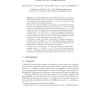Free Online Productivity Tools
i2Speak
i2Symbol
i2OCR
iTex2Img
iWeb2Print
iWeb2Shot
i2Type
iPdf2Split
iPdf2Merge
i2Bopomofo
i2Arabic
i2Style
i2Image
i2PDF
iLatex2Rtf
Sci2ools
140
Voted
EUROCRYPT
2003
Springer
2003
Springer
Two-Threshold Broadcast and Detectable Multi-party Computation
Classical distributed protocols like broadcast or multi-party computation provide security as long as the number of malicious players f is bounded by some given threshold t, i.e., f ≤ t. If f exceeds t then these protocols are completely insecure. We relax this binary concept to the notion of two-threshold security: Such protocols guarantee full security as long as f ≤ t for some small threshold t, and still provide some degraded security when t < f ≤ T for a larger threshold T. In particular, we propose the following problems. ◦ Broadcast with Extended Validity: Standard broadcast is achieved when f ≤ t. When t < f ≤ T, then either broadcast is achieved, or every player learns that there are too many faults. Furthermore, when the sender is honest, then broadcast is always achieved. ◦ Broadcast with Extended Consistency: Standard broadcast is achieved when f ≤ t. When t < f ≤ T, then either broadcast is achieved, or every player learns that there are too many...
| Added | 06 Jul 2010 |
| Updated | 06 Jul 2010 |
| Type | Conference |
| Year | 2003 |
| Where | EUROCRYPT |
| Authors | Matthias Fitzi, Martin Hirt, Thomas Holenstein, Jürg Wullschleger |
Comments (0)

